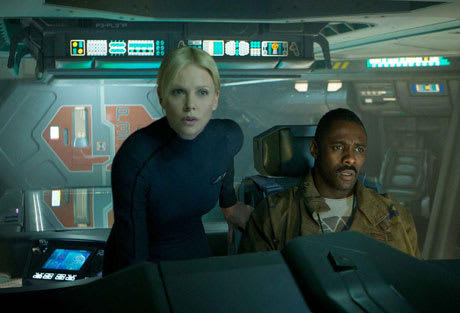Expectation is a tricky thing. Rabid fans of Ridley Scott's 1979 horror/sci-fi masterpiece, Alien, and more so, devotees of its action-loaded sequel may be disappointed by what Prometheus isn't. Fans of clever, introspective science fiction that posits big philosophical questions about the great mysteries of life will be delighted by what it is.
While thrilling and tense much of the time, this isn't a film designed to jolt you with fear; it's not a horror movie. The ideas it explores, however, are far more insidious than simple survival-based terror.
Skipping past the stunning first scene, which answers and asks many questions while setting the tone for the visual feast that follows, we're introduced to a pair of archaeologists that have discovered a pattern in cave paintings all over the globe. Based on the scientifically devout couple's findings, the Weyland Corporation funds a private mission to a nearly habitable planet within a star system that resembles the prehistoric paintings.
The designated crew caretaker and resident expert on the building blocks of ancient language on the Prometheus, a scientific exploration vessel, is a five-year-old artificial intelligence named David, who is housed in a humanoid construct shaped like Michael Fassbender.
The relationships among the rest of the consistently strong ensemble cast, including mission commander Meredith Vickers (Charlize Theron, playing one harsh taskmistress), lead scientists Elizabeth Shaw (Noomi Rapace) and Charlie Holloway (Logan Marshall-Green), some creature-bait crew members and a nod to Alien's blue-collar captain of tomorrow, Dallas (a relaxed and droll Idris Elba), are, while important, less a focus than the rich, naturalistic character dynamics of the crew of the Nostromo.
Prometheus has a great deal of plot to burn through and it leaves many impressions more profound than the fact that waking up from cryogenic sleep looks a lot less pleasant than it will further in the future. Setting up said future is what this picture is all about ― one branch of which genre fans are (or should be) intimately familiar with and another that continues on the more thought-provoking approach to science fiction spectacle established here by Scott and story shapers Damon Lindelof (Lost) and Jon Spaihts.
With exceptional cinematography, superb special effects, a judicious use of 3D and uniquely foreboding architecture, tempered by a playful balancing act between tension and humour, derived from purposefully confounding one expectation while fulfilling another, I, for one, will be voting with dollars to see where the path that is not Alien leads.
(Fox)While thrilling and tense much of the time, this isn't a film designed to jolt you with fear; it's not a horror movie. The ideas it explores, however, are far more insidious than simple survival-based terror.
Skipping past the stunning first scene, which answers and asks many questions while setting the tone for the visual feast that follows, we're introduced to a pair of archaeologists that have discovered a pattern in cave paintings all over the globe. Based on the scientifically devout couple's findings, the Weyland Corporation funds a private mission to a nearly habitable planet within a star system that resembles the prehistoric paintings.
The designated crew caretaker and resident expert on the building blocks of ancient language on the Prometheus, a scientific exploration vessel, is a five-year-old artificial intelligence named David, who is housed in a humanoid construct shaped like Michael Fassbender.
The relationships among the rest of the consistently strong ensemble cast, including mission commander Meredith Vickers (Charlize Theron, playing one harsh taskmistress), lead scientists Elizabeth Shaw (Noomi Rapace) and Charlie Holloway (Logan Marshall-Green), some creature-bait crew members and a nod to Alien's blue-collar captain of tomorrow, Dallas (a relaxed and droll Idris Elba), are, while important, less a focus than the rich, naturalistic character dynamics of the crew of the Nostromo.
Prometheus has a great deal of plot to burn through and it leaves many impressions more profound than the fact that waking up from cryogenic sleep looks a lot less pleasant than it will further in the future. Setting up said future is what this picture is all about ― one branch of which genre fans are (or should be) intimately familiar with and another that continues on the more thought-provoking approach to science fiction spectacle established here by Scott and story shapers Damon Lindelof (Lost) and Jon Spaihts.
With exceptional cinematography, superb special effects, a judicious use of 3D and uniquely foreboding architecture, tempered by a playful balancing act between tension and humour, derived from purposefully confounding one expectation while fulfilling another, I, for one, will be voting with dollars to see where the path that is not Alien leads.
